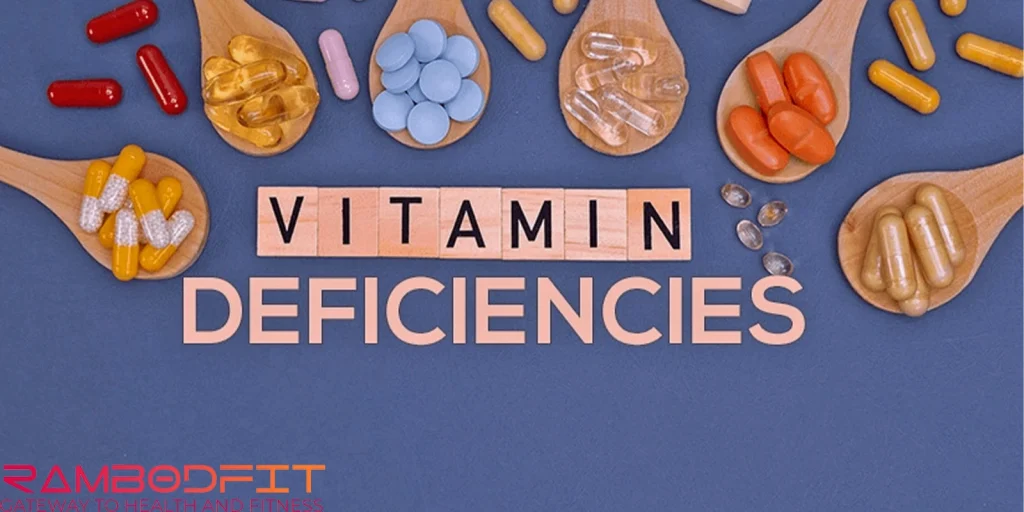


Our hectic modern lives make it tough to spot the subtle hints our bodies give us. You might feel more tired than normal, see your mood change, or find it hard to focus—but blame it on stress, not enough sleep, or just “one of those days.”
What if these points point to something deeper? Vitamin deficiencies can sneak in and affect everything from our mood to our immune system, often without showing up in regular checkups. These are often early signs of vitamin deficiencies that we fail to connect to nutrition.
You don’t need to be underfed to lack nutrients. Mild or “hidden” vitamin shortages happen more often than people realize. Basic blood tests don’t always catch them, but they can harm your health. The upside?
Spotting these shortages and topping up can stop long-term harm and boost your health big time. Recognizing the signs of vitamin deficiencies can be the key to unlocking better energy, mood, and focus.
At Rambodfit, we’ll unpack the subtle signs your body might be hinting at—and how to act. The goal is to help you learn how to recognize signs of vitamin deficiencies before they lead to more serious issues.
Table of Contents

Why doctors might dismiss or overlook your symptoms.
Many shortages show up with unclear signs, like tiredness or mood shifts, that people often blame on daily stress. Even regular blood tests can miss these small imbalances. These vague complaints are often the earliest signs of vitamin deficiencies.
Several things make spotting deficiencies even tougher:
• Stress drains essential nutrients like magnesium, B vitamins, and vitamin C.
• Bad sleep hurts your body’s hormone control and nutrient uptake.
• Gut problems such as IBS, low stomach acid, or imbalanced gut bacteria block absorption.
• Some drugs like metformin, antacids, and birth control pills can rob you of crucial nutrients.
• Junk food lacks the range and richness of micronutrients your body needs.
This perfect storm allows signs of vitamin deficiencies to build up in silence, becoming noticeable only once health begins to decline.
Subtle Clues of Common Vitamin Shortages
How your body might be signaling you, without you realizing it. Most of these are actually signs of vitamin deficiencies that are easy to miss.
The brain and nerve vitamin you could lack.
Hidden Signs:
• Fuzzy thinking
• Pins and needles in hands and feet
• Tiredness, despite good sleep
• Moodiness or temper shifts
People at Higher Risk:
• Those who eat no animal products
• People aged 50+
• Users of metformin or stomach acid drugs
Long-Term Health Risks:
• Damage to nerves
• Mental decline
• Large red blood cell anemia
Vitamin B12 plays a key role in energy metabolism and nerve health. Since it occurs in animal products, plant-based eaters need to take supplements or fortified foods. One of the key signs of vitamin deficiencies related to B12 deficiency is neurological dysfunction.
The “sunshine vitamin” that affects mood and immunity
Hidden Symptoms:
• Feeling down in winter
• Sore muscles and achy bones
• Getting sick or catching a cold often
At-Risk Groups:
• People who work indoors
• Those with darker skin
• People who always wear sunscreen
Long-Term Risks:
• Weak bones
• Prolonged low mood
• Immune system problems
Vitamin D behaves more like a hormone than a vitamin. It influences mood, bone health, and immunity. One of the most overlooked signs of vitamin deficiencies is chronic fatigue and depression caused by low vitamin D levels.
The stress-fighting mineral most people lack
Hidden Signs:
• Eye twitches
• Sleep problems
• Anxiety and irritability
• Cravings for chocolate or salt
Long-Term Dangers:
• High blood pressure
• Insulin resistance
• Migraines
Over 60% of people don’t get enough magnesium from their diets. This leads to subtle signs of vitamin deficiencies like restlessness, poor sleep, and muscle cramps.
A vital component in regulating mood and balancing hormones
Hidden Symptoms:
• Cracked lips or sore tongue
• Irritability and mood swings
• Trouble remembering dreams
• Brain fog
Vitamin B6 supports the production of neurotransmitters like serotonin. When levels are low, one of the most telling signs of vitamin deficiencies is emotional instability or mental fatigue.

Why “normal” blood tests can miss low iron—and how it drains your energy
Hidden Symptoms:
• Cold hands and feet
• Pale skin
• Shortness of breath
• Hair loss
You can have low iron stores even if your hemoglobin is “normal.” Look at ferritin levels—below 30 ng/mL often signals depletion. Fatigue and hair thinning are classic signs of vitamin deficiencies that people often overlook or misattribute to stress.
Beyond immune support, it helps with repair and resilience
Hidden Signs:
• Easy bruising
• Bleeding gums
• Slow wound healing
Vitamin C is crucial for collagen production and fighting oxidative stress. Smokers, athletes, and people with low fruit intake often show signs of vitamin deficiencies related to poor tissue healing and skin integrity.
The vitamin that lifts mood and sharpens memory
Hidden Signs:
• Feeling low
• Trouble focusing
• Irritability
• Constant fatigue
Folate and B12 work together to build red blood cells and regulate mood. Deficiency in either can produce overlapping signs of vitamin deficiencies, such as brain fog and sadness.
Why These Deficiencies Occur—Even If You Eat “Healthy”
Healthy diet ≠ nutrient sufficiency
Even people who eat “clean” can be deficient. Why?
• Digestive problems limit absorption
• Overreliance on packaged “health” foods
• Chronic stress and lack of sleep
• Alcohol, smoking, and intense exercise
• Medications that interfere with nutrient use
These all contribute to the subtle signs of vitamin deficiencies that creep in over time.
Focused ways to get your nutrients back in balance
Whole foods remain the best buffer against signs of vitamin deficiencies.
Don’t guess blindly. Use your test results and symptoms to address signs of vitamin deficiencies appropriately.
These real-world metrics help you catch recurring signs of vitamin deficiencies before they worsen.

Your body whispers before it screams. Small shifts in mood, sleep, energy, or focus might not be “just stress.” They could be signs of vitamin deficiencies. The good news? They’re fixable. Listen to your body, run the right tests, eat intentionally, and supplement wisely. Don’t settle for feeling “okay” when vibrant health is within reach, especially if you’re noticing persistent signs of vitamin deficiencies.
Further Studies
Yes. Your body may lack vitamins even with a good diet. This can happen due to digestive problems, certain medicines, and poor soil quality. You should base your approach on tests and symptoms.
If you’re in a high-risk group or notice any signs, get tested every 6 to 12 months. It’s smart to keep an eye on your iron, vitamin D, B12, and magnesium levels.
Not. Multivitamins often contain small amounts and forms that your body doesn’t absorb well. It’s better to take specific supplements based on your symptoms or lab results.